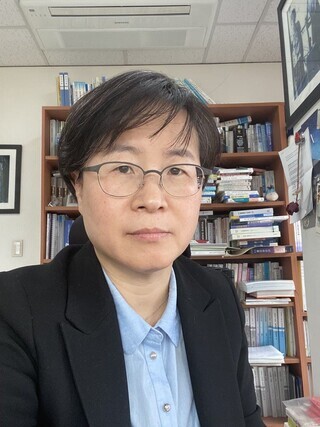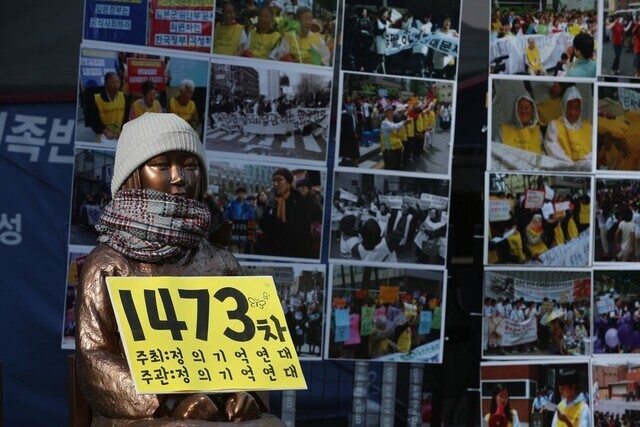[Interview] Comfort women ruling is a matter of human rights over S. Korea-Japan relations
전체 맥락을 이해하기 위해서는 본문 보기를 권장합니다.
Lee interpreted that as representing the "trauma of [an earlier] ruling that awarded compensation to the victims of forced labor" and offered the Japanese reporters some advice: "Ask the Japanese government how it means to provide [compensation] following the ruling."
Lee said she hopes the South Korean government "has the wisdom to take the initiative and discuss the comfort women issue with other countries in Asia rather than holding a narrow view of Korea-Japan relations."
이 글자크기로 변경됩니다.
(예시) 가장 빠른 뉴스가 있고 다양한 정보, 쌍방향 소통이 숨쉬는 다음뉴스를 만나보세요. 다음뉴스는 국내외 주요이슈와 실시간 속보, 문화생활 및 다양한 분야의 뉴스를 입체적으로 전달하고 있습니다.

“When the former comfort women ask Japan to acknowledge the facts and make an official apology, they’re asking Japan not to wage war again,” said Lee Sang-hui, an attorney on a task force handling the comfort women issue for MINBYUN-Lawyers for a Democratic Society.
During an interview with the Hankyoreh on Jan. 12, Lee underlined the significance of a South Korean court finding the Japanese government responsible for compensating the former comfort women.
Lee also cautioned against assuming that the court’s ruling, which came on Jan. 8, would bring South Korea-Japan relations to another crisis. Since the day before the ruling, Lee said, Japanese reporters had been focusing their questions on the possibility of the court’s ruling being carried out by force. Those questions assume that the Japanese government won’t carry out the ruling of its own volition.
Lee interpreted that as representing the “trauma of [an earlier] ruling that awarded compensation to the victims of forced labor” and offered the Japanese reporters some advice: “Ask the Japanese government how it means to provide [compensation] following the ruling.”
“We need to view this from several perspectives. One is how the Japanese government will accept the South Korean court’s ruling at a time when the international order is shifting to protect individual rights. Another is how the Japanese public can be persuaded,” Lee said.

The Japanese government has refused to recognize the South Korean court’s ruling and is considering taking the case to the International Court of Justice (ICJ).
“The Japanese government has consistently held that [all these issues] were resolved by its claims agreement with South Korea. Since it’s reluctant to give the comfort women issue more international attention, it might not file a petition with the ICJ,” Lee said.
“We do have the precedent of the Italian case, but I’m not optimistic because the two cases can’t be compared directly.
An Italian who was forced to work at an arms factory in Germany in 1944 filed for damages in an Italian court in 1998. While his suit was rejected in the first and second instances on the grounds of state immunity, the Italian Supreme Court ultimately sided with him.
Germany took the case to the ICJ, which ruled in its favor, again on grounds of state immunity. But the Italian Constitutional Court overturned that ruling.
“The victim’s attorneys told me there hadn’t been much unrest in Italy following the Supreme Court’s ruling. We shouldn’t get too worked up about claims of a crisis in Korea-Japan relations either,” Lee said.
Lee said she hopes the South Korean government “has the wisdom to take the initiative and discuss the comfort women issue with other countries in Asia rather than holding a narrow view of Korea-Japan relations.”
Former comfort women have filed four civil cases in Japanese court, but all of them have been rejected. The same has happened in cases filed in other countries, including the US.
“By acknowledging that the former comfort women have the right to a trial, this ruling grants them their full citizenship,” Lee said.
“There has been brisk debate about how the international law system can provide relief to people whose human rights have been violated by states or armed groups. The Korean court’s ruling was a chance to change current practices.”
“The court ruled that state immunity doesn’t apply to crimes against humanity and that relief can be provided not only to the former comfort women but to other victims of severe government infringement of human rights,” Lee added.
Lee asserted that the comfort women agreement reached by the South Korean and Japanese governments in 2015 had created ambiguity about whether the former comfort women — who had previously been regarded as deserving pity and financial compensation — had actually received an apology and compensation.
“We need to study why this became a human rights issue and why [the former comfort women] haven’t received an apology,” Lee said.
Lee also advised Koreans not to be frightened about potential pushback from the Japanese government, which issued a summons to the South Korean ambassador in Japan following the court’s verdict.
“If we tell [the former comfort women] to stop making an issue of this, we will be muzzling all victims of serious human rights abuses committed by the state.”
After Kim Jeong-gon, a judge in the 34th civil law division of the Seoul Central District Court, ruled in favor of the plaintiffs, Min Seong-cheol, a judge in the 15th civil law division of the Seoul Central District Court, delayed the sentencing, originally scheduled for Jan. 13, in a damages lawsuit filed against the Japanese government by Lee Yong-soo and other former comfort women.
“We adequately made our case in the trial and submitted as much information as possible to satisfy the court’s questions. I don’t understand why the court would suddenly instruct us to resume arguments two days before the sentencing,” said Lee, who represents the plaintiffs in that lawsuit.
Lee put a positive spin on the delay, remarking that “the court is unlikely to ignore the critical significance of the previous division.”
Lee Yong-soo, the plaintiff, has frequently voiced her frustration about the lack of progress. “We were dragged off to the comfort stations because Koreans didn’t have their own government. But now that we do, why hasn’t the comfort women issue been dealt with?”
Belated as it is, the South Korean court’s recognition of the Japanese government’s responsibility to pay damages is of great significance.
“There are still a lot of issues left to resolve, but the court has created a shelter for the victims and promised to protect them,” Lee said.
By Joh Yun-yeong, staff reporter
Please direct comments or questions to [english@hani.co.kr]
Copyright © 한겨레신문사 All Rights Reserved. 무단 전재, 재배포, AI 학습 및 활용 금지
- 제주 카지노서 사라진 145억원 중 81억원 금고에서 발견
- ‘집합금지’ 어기고 5명 식사모임 가진 여자 프로배구 선수들
- 이만희 신천지 총회장 ‘코로나 방역 방해’ 무죄…횡령은 인정
- 나경원의 ‘독한’ 출마 선언…‘빠루 여장군’ 컨셉트가 통할까?
- [단독]“교수채용 대가로 2억?”…손종국 전 경기대 총장 고발
- 앉아 일하는 당신, 하루 11분 운동도 좋다…하루 35분이 어렵다면
- 15일 오전 6시부터 연말정산 간소화 서비스 시작
- 나라마다 ‘제각각’…중국 시노백 코로나19 백신 효능 미스터리
- 상하목장 우유, 소비자들 ‘빨대 어택’에 응답했다
- 북한의 ‘자력갱생’ 노선은 언제부터 시작된 것일까요?